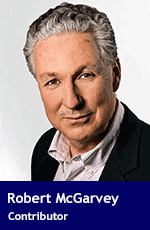 You have to hand it to Donald Trump – he’s done the seemingly impossible. The presumptive Republican nominee for the U.S. presidency has united the right and the left in outrage against his candidacy.
You have to hand it to Donald Trump – he’s done the seemingly impossible. The presumptive Republican nominee for the U.S. presidency has united the right and the left in outrage against his candidacy.
What’s so scary about Trump?
Respected Canadian columnist Terence Corcoran is fearful that a Trump presidency would signal the end of the North American Free Trade Agreement. He is shocked that “Nobody seems to care that Trump is threatening to blow up an international trade order.”
Business leaders are beginning to be alarmed. Jayson Myers, head of the Canadian Manufacturers and Exporters association, is concerned that his U.S. colleagues are – only now – awakening to the possibility that a future Republican president could overturn the entire global trading system with disastrous results.
But free traders aren’t the only ones lining up to kick Trump. His impressive list of critics range across the political spectrum, from Bernie Sanders on the far left to right-wing champion Rand Paul, who claims the Tea Party has been “hijacked and hoodwinked” by Trump.
With this remarkable array of detractors, what explains Trump’s popularity?
It’s increasingly clear that the failure of establishment candidates to address or deal with serious problems has opened the door for Trump and his prejudices.
The American public is tuning out a do-nothing Congress. The contempt is universal but directed at Republicans in particular, since their only goals seem to be to obstruct the business of government, demonize their political opposition, and ignore the growing anguish and frustration of the public.
In contrast to the constant refrain of obstructionist political double-talk, Trump entered the Republican nomination contest wild-eyed and angry. He’s loose lipped and unafraid to tackle tough issues like immigration (he said he would build a wall along the U.S.-Mexican border), terrorism (he’d ban Muslims from entering the country) and global chaos (he’d limit military interventions unless U.S. national interests were at stake).
Pundits of all political strips disagree vehemently with his solutions, but establishment politicians won’t even begin to address these serious subjects. The public increasingly wants to know why not?
Perhaps Trump’s most effective ace in the hole is the economy. A growing number of Americans feel that their country is falling behind – and, importantly, they’ve lost faith in the establishment’s willingness to protect their interests.
It was a Republican president, Abraham Lincoln, who famously said a republic is government “of the people, by the people, for the people.” Regrettably, a lot of Americans now believe that the U.S. is government of the privileged, by the privileged, for the privileged.
It doesn’t take a Harvard economist to see that while the stock market is rising and multinational businesses are prospering, the average American wage earner is suffering a loss of purchasing power and lifestyle. They’re more than willing to blame the establishment for betraying them and their future.
Perceptions (and misperceptions) are now more important than facts. In a recent article, Corcoran listed a catalogue of Trump misrepresentations: “His claims on U.S. trade deterioration are wrong. His repeated charge that the U.S. has lost employment due to free trade deals is grossly misleading and, on a net basis, inaccurate. His claim to be able to bring back manufacturing jobs from abroad cannot possibly be fulfilled.”
None of this seems to matter. The number of Trump supporters continues to grow and – shockingly – an increasing number of Sanders’ younger supporters are moving to Trump, unwilling to throw their support behind Democrat front-runner Hillary Clinton because they perceive her to be compromised by Wall Street and other big business interests.
Who’s afraid of Donald Trump? The establishment.
In reality, ‘free’ trade was never about advancing the welfare of nations; it’s focused on creating cost savings for multinational corporations and protecting the interests of investors. Instead of raising the living conditions and wages of all workers to western standards, ‘free’ trade has done the reverse, initiating a scramble to the bottom for wages and working conditions.
The establishment has had its way for 40 years, relying on reflex support from the public for free markets and an investor-friendly globalization agenda, and using its money to buy whatever votes are needed to maintain the status quo.
Trump has thrown a political grenade into the establishment camp and, whatever happens in November, he’s riding a wave of populist anger that could shake the foundations of the global order.
Robert McGarvey is an economic historian and former managing director of Merlin Consulting, a London, U.K.-based consulting firm. Robert’s most recent book is Futuromics: A Guide to Thriving in Capitalism’s Third Wave.
Robert is a Troy Media contributor. Why aren’t you?
The views, opinions and positions expressed by columnists and contributors are the author’s alone. They do not inherently or expressly reflect the views, opinions and/or positions of our publication.


